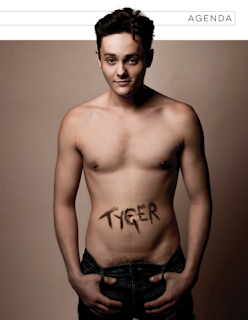Season 1 (2012) was simple: Stuffy button-down lawyer Ken (Greg Davies) discovers that his medical-student daughter Rachel (Tamla Kari) has up and married an American hippie named Cuckoo (Andy Samberg), who exemplifies everything the British don't like about the Americans: he's loud, exuberant, lazy, irresponsible, and certifiably nuts.
Ok, an odd couple comedy. Cuckoo teaches Ken how to be less stuffy, and Ken teaches Cuckoo some responsibility.
There's also a certifiably nuts teenage son, Dylan, lying about and playing video games.
Season 2 (2014): Cuckoo is long gone, disappeared during a mountain-climbing expedition in the Himalayas and presumed dead.
Rachel (recast with Esther Smith) has moved on, and has a new boyfriend, Ben (Matt Lacey).
But then Dale (Taylor Lautner, left) shows up, claiming to be Cuckoo's son, raised in a Himalayan religious cult.
Um...Cuckoo was in his 20s. How....?
At first everyone suspects that Dale is conning them, but he's so utterly innocent -- jumping in bed with Ken and his wife when he has a bad dream, calling Rachel "Mom" even though she's his age, that they come around, and lets him move in.
I like the episode "Funeral," in which Dale meets Ken's old college professor for five minutes, and then is overwhelmed with grief when he dies --- obviously displaced grief for his dead father. He insists on going to the funeral, where he is mistaken for the professor's "young American friend," i.e., lover. But no homophobic panic results from the confusion.
Dale begins sparking with his stepmother Rachel, and confesses his love in a Christmas special. She rejects him, and he leaves town.
Season 3 (2016): Dale is long gone, vanished and presumed dead. Ken and his wife have a new baby, Rachel is dating, and Dylan (Tyger Drew-Honey, left) is off to University. Then...Dale returns! He's been living in China, working for a man who, unbeknownst to him, is a gangster. This will become important later.
In spite of his high-concept return, Dale takes a back seat this season, which is mostly about the new baby. Plus Steve (Kenneth Collard) is added to the cast, a friend of the family with no boundaries and unacknowledged homoerotic desires.
Season 4 (2018): At least nobody has vanished this time. Baby Sid is now a toddler, and Dale works as his nanny (to explain why he's still around). He's also dating Rachel, and he opens a bar with Steve. But the season is mostly about Ken's job problems and midlife crisis.
I like the episode where Sid happens to be wearing girls' clothes when they bring him to interview at an exclusive daycare (if he has a full-time nanny, why...), and the teacher mistakes him for transgender. They end up throwing a party for transgender toddlers.
And the episode where Ken gets a crush on his neighbor Lloyd (Nigel Harmon), an uninhibited free spirit -- um, like Cuckoo and Dale?

Season 5 (2019): Dale is gone without explanation. I'm guessing that he was becoming too respectable, with a full-time job and a permanent relationship.
But not to worry, another "cuckoo," an uninhibited innocent, arrives to cause havoc: Ken's long-lost sister Ivy (Andie McDowell). Mostly the season is about Ken's political career, as he runs for M.P.
We've come a long way from the American hippie who married Rachel back in 2012. But at least there have been a lot of gay references and bare chests.
















